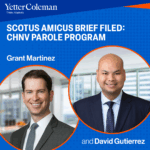Yetter Coleman LLP partner Grant B. Martinez and associate David J. Gutierrez filed an amicus brief in the U.S. Supreme Court case Noem v. Doe on behalf of the Cato Institute and Professor Ilya Somin of the Antonin Scalia Law School.
 The brief opposes lifting an order issued by the District of Massachusetts, which temporarily stays the Trump Administration’s premature termination of status for over 500,000 people legally present in the United States under the CHNV parole program.
The brief opposes lifting an order issued by the District of Massachusetts, which temporarily stays the Trump Administration’s premature termination of status for over 500,000 people legally present in the United States under the CHNV parole program.
The program allowed citizens from the named countries to request two-year humanitarian parole if they had a U.S. sponsor willing to provide financial and other support. In March 2025, the new administration attempted to cut short all two-year parole terms for more than 500,000 program beneficiaries, giving them only 30 more days of lawful U.S. immigration status and work authorization. Opponents of the move are challenging that termination.
The amicus brief argues that categorical parole programs have deep historical roots, with more than 125 categorical programs established since the Eisenhower Administration. It also notes that the CHNV program followed established statutory requirements and produced measurable benefits by reducing illegal southern border crossings from the covered countries. The brief details the severe conditions in Cuba, Haiti, Nicaragua, and Venezuela that prompted program beneficiaries to flee to the U.S., including political oppression, violence and economic crises.
In the brief, Martinez and Gutierrez also highlight the potential risk to other groups if the Supreme Court allows the Trump administration to proceed with terminating the CHNV parole program. Accepting the government’s position on CHNV would endanger the status of more than 100,000 Ukrainians in the U.S. under the similar Uniting for Ukraine program, which uses the same legal authority.
“The Supreme Court is being asked to make this decision on such a quick timeframe, and we wanted to reinforce with our brief that the CHNV program was legally established,” Martinez said. “We’re also encouraging the Court to see this case more broadly in terms of future impact on other groups, such as Ukrainians fleeing the war with Russia. That is in addition to the fact that there are 500,000 people who face having to leave the U.S. on extremely short notice and return to countries in dire circumstances.”